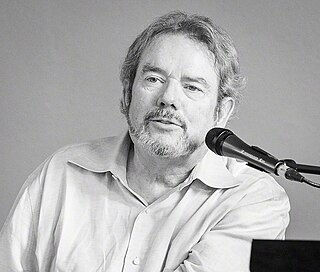
Jimmy Layne Webb is an American songwriter, composer, and singer. He achieved success at an early age, winning the Grammy Award for Song of the Year at the age of 21. During his career, he established himself as one of America's most successful and honored songwriter/composers.

Lawyers in Love is the seventh album by American singer-songwriter Jackson Browne, released in 1983. It reached number 8 on the Billboard Pop album chart and number 30 on the Billboard 200. It was Browne's fourth straight Top 10 album and stayed on the charts for 33 weeks. Out of eight tracks, four were released as singles. The title song was a top-20 pop hit for Browne, and was accompanied by one of his first music videos released on MTV.

The Kentucky Headhunters are an American country rock and Southern rock band originating in the state of Kentucky. The band's members are Doug Phelps, Greg Martin, and brothers Richard Young and Fred Young. It was founded in 1968 as Itchy Brother, which consisted of the Young brothers and Martin, along with Anthony Kenney on bass guitar and vocals. Itchy Brother performed until 1982, with James Harrison replacing Martin from 1973 to 1976. The Youngs and Martin began performing as The Kentucky Headhunters in 1986, adding brothers Ricky Lee Phelps and Doug Phelps to the membership.

Romantic Warrior is the sixth studio album by the American jazz fusion band Return to Forever, released in 1976 by Columbia Records. After releasing their previous album, No Mystery (1975), their fourth for Polydor Records, the group moved to Columbia and retreated to Caribou Ranch near Nederland, Colorado to record their next album. It was also their first to be credited solely to Return to Forever, removing the "featuring Chick Corea" tag. The album is more avant-garde and less funky than No Mystery, and remains the band's highest selling album with over 500,000 copies sold in the US.

Anticipation is the second studio album by American singer-songwriter Carly Simon, released by Elektra Records, in November 1971.
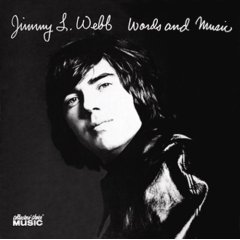
Words and Music is the second album by American singer-songwriter Jimmy Webb, released in 1970 by Reprise Records. This was the first album authorized by the artist.
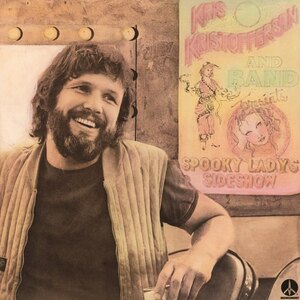
Spooky Lady's Sideshow is the fifth solo album by Kris Kristofferson, released in 1974 on Monument Records. It was preceded and followed by duet albums with his wife, Rita Coolidge. It was recorded shortly after Kristofferson's appearance in the movie Pat Garrett and Billy the Kid. The album mostly consists of songs about decline due to alcohol and drug abuse. That theme of decline proved to be (unintentionally) prophetic as this was Kristofferson's first album that failed to see commercial success on a large scale.
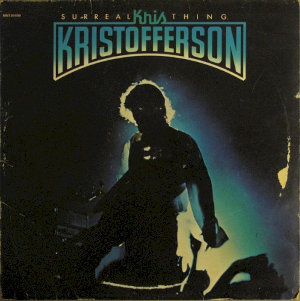
Surreal Thing is the seventh solo album by Kris Kristofferson, released in 1976 on Monument Records. "Killing Time" and "The Golden Idol" are re-recordings of songs that were originally released as a single in 1967.
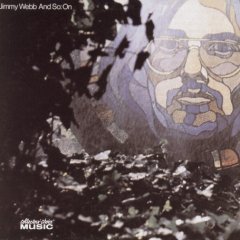
And So: On is the third album by American singer-songwriter Jimmy Webb, released in May 1971 by Reprise Records. Following the commercial failure of his second album, Words and Music, Webb was given a second chance by Reprise, who wanted a follow-up as soon as possible. In May 1971, only six months after the release of its predecessor, And So: On was released.
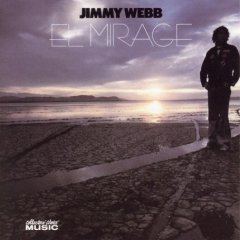
El Mirage is the sixth album by American singer-songwriter Jimmy Webb, released in May 1977 by Atlantic Records. This was the second album for which Webb handed production and arrangement duties on to another person, George Martin, producer of the Beatles. The album contains "The Highwayman", a song that later provided both the name and first hit for the Highwaymen. Jennings also recorded the track "If You See Me Getting Smaller" for his album Ol Waylon (1977). The cover was photographed at El Mirage Lake, Mojave Desert, California.

Screenplaying is a compilation album by British singer-songwriter and guitarist Mark Knopfler, released on 9 November 1993 by Vertigo Records internationally and Warner Bros. Records in the United States. The album contains previously released tracks from Knopfler's soundtrack albums Cal (1984), Last Exit to Brooklyn (1989), The Princess Bride (1987), and Local Hero (1983).

"I'm Gonna Love You Too" is a song written by Joe B. Mauldin, Niki Sullivan and Norman Petty, originally recorded by Buddy Holly in 1957 and released as a single in 1958. It was covered 20 years later by American new wave band Blondie and released as the lead single in the U.S. from their multi-platinum 1978 album Parallel Lines.

High Cumberland Jubilee is the second studio album by American popular-music singer and songwriter Jimmy Buffett. It was produced by Travis Turk, recorded in 1971 for Andy Williams's small Barnaby Records label. This was second album that Buffett recorded, and was his final album with Barnaby, signing next with Dunhill. Following lackluster sales of Buffett's first album, Down to Earth, Barnaby Records would claim that the masters to High Cumberland Jubilee had been lost, hence it has been referred to as Buffett's "lost album." In 1976, after Buffett had left Barnaby and moved to Key West, released numerous additional albums, and become a star, the masters were finally found and the album released.

What About Today? is the eleventh studio album released in July 1969 by Barbra Streisand. It is considered to be her first attempt at recording contemporary pop songs and features songs by The Beatles and Paul Simon, among others.

Ten Easy Pieces is the ninth album by American singer-songwriter Jimmy Webb, released in October 1996 by Guardian Records. The album consists of new arrangements of some of Webb's most popular songs.

Suspending Disbelief is the eighth album by American singer-songwriter Jimmy Webb, released in September 1993 by Elektra Records.

Angel Heart is the seventh album by American singer-songwriter Jimmy Webb, released in April 1982 by Real West Production.

Honey is the twenty-second studio album by American pop singer Andy Williams, released in the spring of 1968 by Columbia Records. In reviewing the LP William Ruhlmann of Allmusic traced the progression of the Williams formula, noting that "he had been drawing on the recent hit parade for some of his material for years. But Honey marked his complete crossover to such an approach. Where earlier Williams albums had been a canny mix of movie songs, standards, pop hits, and foreign -- especially French -- material, ten of Honey's 11 tracks were songs that had been Top 40 hits in the last two years."

Somewhere There's a Someone is a 1966 studio album by Dean Martin, produced by Jimmy Bowen.

Once in a While is a 1978 studio album by Dean Martin, produced by Jimmy Bowen. It was released four years after it was recorded.




















